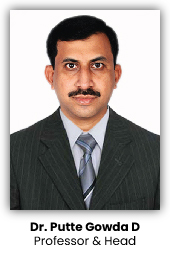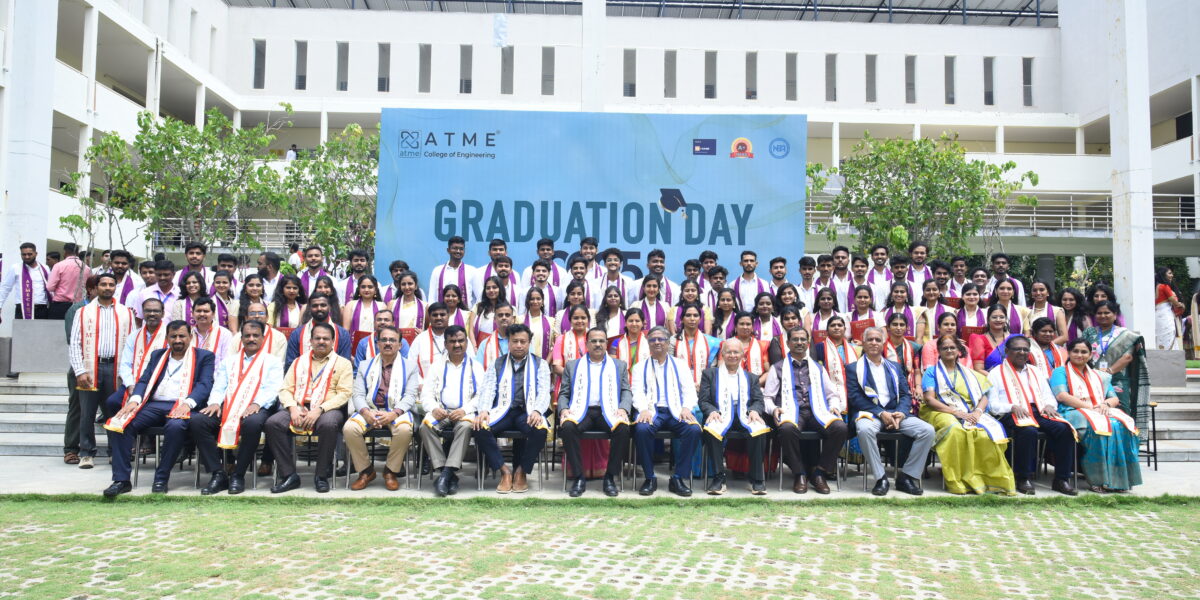About the Department:
The department of Computer Science & Engineering was established in the year 2010 with intake of 60 students and was enhanced to 180 students in 2024. The department is a pioneering academic centre for higher education, research, and innovations in key areas of Computer Science. It has been imparting quality education to meet the technological advancements and industrial requirements. This has been made possible due to highly qualified and experienced faculties with excellent academic track record. There is a proportionate mix of academic and industrial experience amongst the faculty which is influential in imparting the right blend of theoretical and practical knowledge to the students. The department has state of the art laboratories and excellent infrastructural facilities that provide the students with quality education that matches global standards. The first initiative taken by the department was to start the student branch of ‘Computer Society of India’ – CSI, a professional body at National level, in the year 2012, all the students in the department were enrolled as student members. The College also obtained CSI Institutional Membership and most of the staff members are Life Members of CSI. Department Library has been set up with more than 1110 Volumes on shelves.
HOD’s Message

Department of Computer Science & Engineering commits to work towards developing dedicated professionals with a rich blend of competent, technical, managerial and social skills to contribute nation building. The Department with highly qualified and experienced team of faculty with industry and research background dedicates to strengthen effective teaching learning process in the ambiance of conducive environment with well supported and stuffed curricular and co-curricular activities. The Department of Computer Science & Engineering has a state of the art facility that provides the students with quality education that matches global standards and truly an academic ambiance of excellence. The Department is wide open to innovative ideas, methodologies to establish itself as the most sought excellent learning center.
– Dr Puttegowda D, HOD
- To develop highly talented individuals in Computer Science and Engineering to deal with real world challenges in industry, education, research and society.
- To inculcate professional behavior, strong ethical values, innovative research capabilities and leadership abilities in the young minds & to provide a teaching environment that emphasizes depth, originality and critical thinking.
- Motivate students to put their thoughts and ideas adoptable by industry or to pursue higher studies leading to research
After successful completion of program:
- PEO1: Empower students with a strong basis in the mathematical, scientific and engineering fundamentals to solve computational problems and to prepare them for employment, higher learning and R&D
- PEO2: Gain technical knowledge, skills and awareness of current technologies of computer science engineering and to develop an ability to design and provide novel engineering solutions for software/hardware problems through entrepreneurial skills.
- PEO3: Exposure to emerging technologies and work in teams on interdisciplinary projects with effective communication skills and leadership qualities.
- PEO4: Ability to function ethically and responsibly in a rapidly changing environment by applying innovative ideas in the latest technology, to become effective professionals in Computer Science to bear a life-long career in related areas.
Engineering Graduates will be able to:
- PO1. Engineering knowledge: Apply the knowledge of mathematics, science, engineering fundamentals, and an engineering specialization to the solution of complex engineering problems.
- PO2. Problem analysis: Identify, formulate, review research literature, and analyze complex engineering problems reaching substantiated conclusions using first principles of mathematics, natural sciences, and engineering sciences.
- PO3. Design/development of solutions: Design solutions for complex engineering problems and design system components or processes that meet the specified needs with appropriate consideration for the public health and safety, and the cultural, societal, and environmental considerations.
- PO4. Conduct investigations of complex problems: Use research-based knowledge and research methods including design of experiments, analysis and interpretation of data, and synthesis of the information to provide valid conclusions.
- PO5. Modern tool usage: Create, select, and apply appropriate techniques, resources, and modern engineering and IT tools including prediction and modelling to complex engineering activities with an understanding of the limitations.
- PO6. The engineer and society: Apply reasoning informed by the contextual knowledge to assess societal, health, safety, legal and cultural issues and the consequent responsibilities relevant to the professional engineering practice.
- PO7. Environment and sustainability: Understand the impact of the professional engineering solutions in societal and environmental contexts, and demonstrate the knowledge of, and need for sustainable development.
- PO8. Ethics: Apply ethical principles and commit to professional ethics and responsibilities and norms of the engineering practice.
- PO9. Individual and team work: Function effectively as an individual, and as a member or leader in diverse teams, and in multidisciplinary settings.
- PO10. Communication: Communicate effectively on complex engineering activities with the engineering community and with society at large, such as, being able to comprehend and write effective reports and design documentation, make effective presentations, and give and receive clear instructions.
- PO11. Project management and finance: Demonstrate knowledge and understanding of the engineering and management principles and apply these to one’s own work, as a member and leader in a team, to manage projects and in multidisciplinary environments.
- PO12. Life-long learning: Recognize the need for, and have the preparation and ability to engage in independent and life-long learning in the broadest context of technological change.
- PSO1: Ability to apply skills in the field of algorithms, database design, web design, cloud computing and data analytics.
- PSO2: Apply knowledge In the field of computer networks for building network and internet based applications.
- To conduct programs for students to acquire technical skills, soft skills and leadership qualities.
- To conduct student technical paper contest at national level in association with professional bodies.
- To conduct certification courses in collaboration with software giants like Microsoft, Phillips, IBM, CISCO, Infosys, HP etc.,
- Establish research laboratories under industry- institution collaboration.
- Organize national / international / seminar / conference / workshop in the latest technologies.
- To conduct faculty development programs regularly for skills upgardation.
| Program | Leading to… | Duration | Intake |
| Computer Science and Engineering | B.E (CSE) | 4 Years | 180 |
- To promote research and consultancy activities.
- To strengthen the industry- institute interaction.
- To have more number of publications and patents in the emerging areas of information technology.
- To be among the top ten leading institute in India and be recognized as the best department in terms of research and innovation.
- To take up research projects from government / AICTE / VTU and other funding organizations.
3rd semester |
Section A – Shrilakshmi PrasadSection B – Roopa BSection C – Sandesh R |
Shrilakshmiprasad_cs@atme.edu.inRoopab.cs@atme.edu.inShandesh_cs@atme.edu.in |
5th semester |
Section A – Ashwini PSection B – Kavyashree E D |
Ashwinip.cs@atme.edu.inKavyashreeed_cs@atme.edu.in |
7th semester |
Section A – Kalathma M KSection B – Keerthana M M |
Kalathmamk_cs@atme.edu.inKeerthanamm_cs@atme.edu.in |


